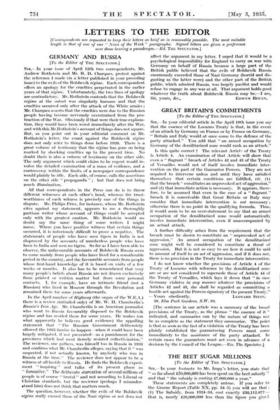LETTERS TO THE EDITOR
[Correspondents are requested to keep their letters as brief as is reasonably possible. The most suitable length is that of one of our "News of the Week" paragraphs. Signed letters are given a preference over those bearing a pseudonym —Ed. THE SPECTATOR.]
GERMANY AND RUSSIA
[To the Editor of THE SPECTATOR.] Sia,--In your issue of April 12th two correspondents, Mr. Andrew Rothstein and Mr. R. D. Charques, protest against the reference I made (in a letter published in your preceding issue) to the evils of the Bolshevik regime. Each correspondent offers an apology for the cruelties perpetrated in the earlier years of that regime. Unfortunately, the two lines of apology are contradictory. Mr. Rothstein contends that the Bolshevik regime at the outset was singularly humane and that the cruelties occurred only after the attack of the White armies ; Mr. Charques asserts that the cruelties were due to the Russian people having become nervously overstrained from the pro- traction of the War. Obviously if that were their true explana- tion, they would have been worst immediately after the War, and with this Mr.Rothstein's account of things does not square. But, as you point out in your editorial comment on Mr. Rothstein's letter, the count against the Bolshevik regime .does not only refer to things done before 1920. There is a great volume of testimony that the regime has gone on being marked by shocking cruelties up to the present time. No doubt there is also a volume of testimony on the other side. The only argument which could claim to be cogent would in- volve the detailed examination of a mass of evidence, and a controversy within the limits of a newspaper correspondence would plainly be idle. Each side, of course, calls the assertions on the other side " propaganda " ; but that does not bring much illumination.
All that correspondents in the Press can do is to throw different witnesses at each other's head, whereas the trust- worthiness of each witness is precisely one of the things in dispute. Mr. Philips Price, for instance, whom Mr. Rothstein cites against my statement, appears to me a thoroughly partisan writer whose account of things could be accepted only with the greatest caution. Mr. Rothstein would no doubt say the same thing of some writers I might name. Where you have positive witness that certain things occurred, it is notoriously difficult to prove a negative. The statements of people who have seen tigers in India is not disproved by the accounts of numberless people who have been to India and seen no tigers. So far as I have been able to observe, the unfavourable accounts of Bolshevik Russia seem to come mainly from people who have lived for a considerable period in the country, and the favourable accounts from people whose first-hand knowledge of it is based on visits of a few Weeks or months. It also has to be remembered that very many people's beliefs about Russia are not drawn exclusively from printed or written matter but from some personal contacts. I, for example, have an intimate friend (not a Russian) who lived in Moscow through the Revolution and remained there for some years afterwards.
In the April number of Highway (the organ of the W.E.A.) there is a review (initialled only) of Mr. W. H. Chamberlin's Russia's Iron Age. Mr. Chamberlin is an American journalist who went to Russia favourably disposed to the Bolshevik regime and has resided there for some years. He makes (on
what apparently he believes good evidence) the appalling statement that " The Russian Government deliberately allowed the 1933 famine to happen—when it could have been largely mitigated, if not prevented—as a punishment for the provinces which had most fiercely resisted collectivization."
The reviewer, one gathers, was himself too in Russia in 1933 and confirms what Mr. Chamberlin alleges, saying that it " was suspected, if not actually known, by anybody who was in Russia at the time." The reviewer does not appear to be a witness at all hostile to Russia. He finds the Bolshevik experi- ment " inspiring " and talks of its present phase as
" formative." The deliberate starvation of several millions of
people is of course brutal " and not according to Liberal or Christian standards, but the reviewer (perhaps I misunder- stand him) does not think that matters much.
The question, however, whether the evils of the Bolshevik regime really exceed those of the Nazi regime or not does not
affect the argument in my letter. I urged that it would be a psychological imposiiffility for England to carry on war with Germany on behalf of Russia because a large part of the British public believed that the evils of Bolshevik Russia enormously exceeded those of Nazi Germany (horrid and dig- gusting as the latter were) and the other part of the British public, which admired Russia, was largely pacifist and would refuse to engage in any war at all. That argument holds good whatever the truth about Bolshevik Russia may be.—I am,














































 Previous page
Previous page